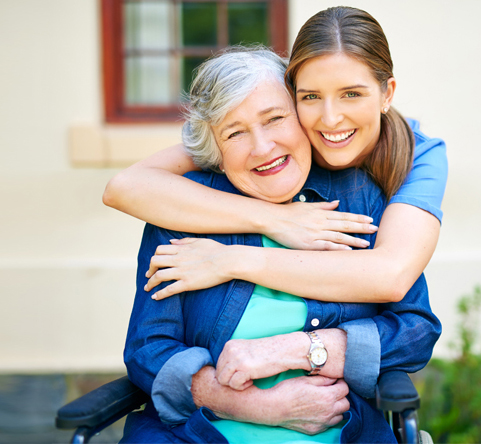Family caregivers: Society’s uncapped heroes
By: Diana Bello Aristizábal
November is National Family Caregivers Month and also Thanksgiving Month, the perfect occasion to pay tribute and say thank you to those who provide physical and emotional care to their loved ones, whether because they were diagnosed with an illness or have a disability.
They do what perhaps not many would do: devote their time to providing emotional and medical support, as well as assistance on different fronts without payment and, more often than not, at the cost of their own needs, careers and interests. They cook, make appointments, give medications, bathe, dress, clean, pay bills, and drive family members to treatments and medical appointments, among other tasks.
This job takes up a lot of daily hours of their time. According to a report made by VITAS Healthcare, the nation’s leading provider of end-of-life care, the medical care provided by a family caregiver in the United States represents a total cost of $470 billion, that is, the value of $37 billion hours of care per year and per caregiver providing 18 hours of medical assistance per week if they charged $12.51 per hour.
A large majority of them must continue earning an income with the aggravating circumstance of needing more money to cover the medical and/or hospital expenses of the people they care for, in some instances. According to the same report, 60% of family caregivers are employed, either on a full or part-time basis, and 40% of those who are unemployed said their role as caregivers impacted their ability to look for or accept a job.
They save lives and spread happiness, but they also suffer
The work performed by family caregivers is one of the most important ones in society. “The well-being and quality of life of the person they care for it’s on their hands. They also play a pivotal role in the success of illness treatments,” said Guadalupe Rodriguez, counseling program manager at United HomeCare, a leading organization in community care and home health, in an interview with this journal.
 In addition, they contribute significantly to the emotional stability of their loved ones, which is essential considering that today we know the power that emotions and thoughts have on physical health. In other words, by providing emotional support they are also extending the lives of those they care for.
In addition, they contribute significantly to the emotional stability of their loved ones, which is essential considering that today we know the power that emotions and thoughts have on physical health. In other words, by providing emotional support they are also extending the lives of those they care for.
This in the case of patients with complex diseases such as Alzheimer’s is no small achievement. “Alzheimer’s disease is a degenerative and progressive illness that changes the behavior of the person who suffers from it, creating a very high level of stress in their caregiver,” says Rodriguez.
A diagnosis like the one above not only brings a lifestyle change for the patient, but also for the caregiver, whose reality transforms from one day to the next. Depending on the illness or disability, the caregiver may go from having a relatively normal life to, perhaps, needing to quit their job and, consequently, losing their income.
Trinidad Argüelles didn’t have to give up a job because she was only a 13-year-old girl when she began taking care of her mother, but she did see her life transforming before her eyes. “I am the eldest. My two sisters were 12 and 11 years old at the time, and we had just arrived in the United States as immigrants when my mother was diagnosed with stage 4 breast cancer,” she says.
The family didn’t have support from anyone at the time (years later an uncle assisted them), so she and her sisters did housework while their father was outside making a living. During the day, he was a garbage collector and at night, he worked in construction.
“My sisters and I got up very early in the morning, made breakfast, organized the house and then went to school, during which time my mother stayed home alone, and sometime later friends of the family started visiting her during those hours. Then, when we came back from school, we would be with her during medical treatments, do homework and I would prepare dinner while my sisters would mop the floor.”
In addition to that, they also gave her medication and when she was hospitalized, they took turns to watch and assist her. The girls’ commitment was such that they took a course to become certified nurse assistants, not out of an interest to follow that career path, but more so to avoid hiring someone for their mother’s care and also to assist her with confidence.
And how did they protect themselves emotionally during those difficult times? Trinidad says that because they went to church and were focused on their studies, they never had an emotional crisis. They also went briefly to family therapy.
Argüelles, who today is an associate professor of psychology at Miami Dade College and a gerontologist with a master’s and a doctorate degree, took care of her mother until she was 30, the age she lost her. “My mom never stopped being a mom. In fact, sometimes despite not feeling well, she would stay up until 2 or 3 a.m. helping us review English words (they only spoke Spanish at the beginning), because she always told us we had to get to college on scholarships.”
Life has not been easy for Mike Tamayo either since he began taking care of his mother 7 years ago. She fell one day, hit her head and developed dementia. “It’s something very difficult to handle. Every day and at every moment, the person acts differently,” he says.
“Once she went out into the street without me noticing and the police brought her back. I had to double lock the door. Sometimes she yells at me and forgets I am her son. I learned it’s the disease talking for her and I don’t take it personally.”
The advice his mother gave him all his life helped him not to go down emotionally after learning he had to take care of her almost 24 hours a day considering dementia requires constant monitoring. She always told him that if we don’t have control over a circumstance, we must try to do things as best as possible without resisting reality or dwelling on small things.
“I have to bathe her and the whole bathroom gets wet, well why does it matter? What is a wet floor anyway? The important thing is that she doesn’t fall. You have to focus on what you are doing and why you are doing it, and not on how terrible your circumstances are.”
Caregivers, ask for help!
Since being a caregiver is an enormous challenge, in addition to thanking them for their hard work, we must talk about what they need. “It’s key to gather enough information about the care that a certain condition requires. This involves having a medical team that guides them well on how to handle a situation. They also need to seek direct support from family members and resources from organizations such as the Alliance for Aging,” says Guadalupe.
“I have memories of the places we went to with my mother to ask for help and in many of them, even when they couldn’t assist us with what we needed, they gave us a smile or lent a hand any way possible. That is very helpful, as are support groups, because it’s not easy to go through this,” says Trinidad.
According to Guadalupe, many caregivers don’t ask for help from family members or close friends fearing they will become a nuisance, and this is a mistake. Although she recognizes that unfortunately there are cases in which indifference prevails, it is often the caregivers themselves who refuse to receive assistance. “There are things so simple to do that perhaps the caregiver’s son or daughter can do it without a problem, such as paying a bill online or going to the supermarket.”
“It’s the circle of life,” says Guadalupe. This means that if as children our parents did everything for us, as adults we can support them by understanding that any act, no matter how small, is for them one less task to do and more time to take a necessary and well-deserved break.

